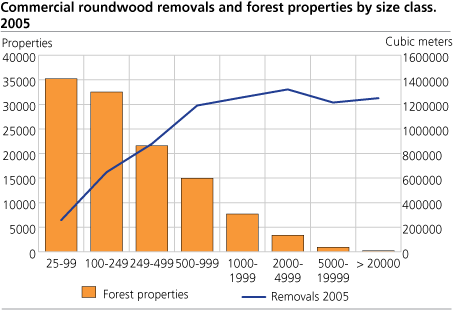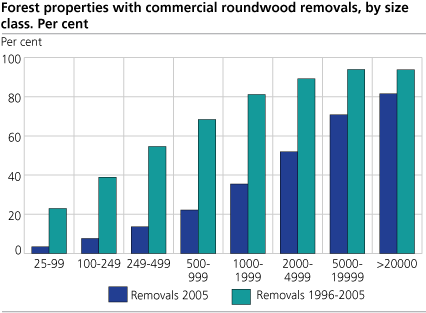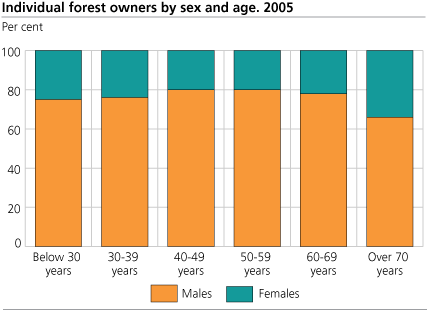Content
Published:
This is an archived release.
Many forest owners seldom cut for sale
One in ten forest owners cut for sale in 2005. During the last ten years, less than half of the forest properties had commercial felling.
In the period 1996-2005, commercial roundwood removals were carried out on 53 000 out of 116 500 forest properties. Only one in three of the properties with less than 500 decares productive forest area cut for sale during the last ten years.
Forest owners in Vestfold and Buskerud the most active
In 2005, almost 15 300 forest owners cut for sale. The forest owners in Buskerud were the most active, where one in four carried out commercial roundwood removals. The forest owners in Hedmark came just behind.
During the last ten years, the forest owners in Vestfold and Buskerud were the most active. Cutting for sale took place on 67 per cent of the forest properties in these counties. In Hedmark, the corresponding percentage was 66 per cent.
In 2005, the average commercial roundwood removals per property were 525 cubic metres. Almost one third of the total roundwood removals in 2005 originated in Hedmark, where the average quantity came to 988 cubic metres.
Average property size 572 decares
Based on the Farm Register 2005, Norway has 116 502 forest properties with at least 25 decares productive forest area. The average property size is 572 decares. Forest properties with more than 500 decares productive forest area represent almost four fifth of the productive forest area, but less than one fourth of the number of forest properties. These properties carried out almost 80 per cent of the commercial round wood removals in 2005.
The middle sized properties most intensive
In the last ten year period, properties between 5000 and 20 000 decares performed the biggest volume of cuttings per decare productive forest area. Even though there are many small properties that seldom or never cut for sale, the difference in quantity cut per decare productive forest vary slightly for the properties with less than 2 000 decares. The smallest properties with fellings cut the equal quantity per decares as the larger properties in this size class. On properties with more than 20 000 decares, forest area felling was less intensive per decare. A possible explanation is that some of the big properties have a higher share of protected area or not very productive area.
One in four forest owners are a woman
24 per cent of the individual forest owners are women, and the female share is increasing among the youngest forest owners. The explanation is that more women have taken over their parents’ properties since they got the same hereditary rights as men back in the 1970s. Among forest owners above 70 years of age, one in three is a woman. The main reason is that women get older than men. On the other hand, the female share is decreasing by the size of the property.
Two in three forest owners are more than 50 years old. In average, they are nearly 57 years old, the women being a couple of years older than the men.
Tables:
- Table 1 Forest properties by county and size class. 2005
- Table 2 Productive forest area by county and size class in decares. 2005
- Table 3 Commercial roundwood removals, by county and property size in decares.Solid cubic metres. 2005
- Table 4 Forest properties with commercial roundwood removals, by county and property size. 2005
- Table 5 Forest properties by number of years with commercial roundwood removals in the period 1996-2005. By county and size class
- Table 6 Forest owners by sex, county and property size. 2005
Contact
-
Terje Olav Rundtom
E-mail: terje.olav.rundtom@ssb.no
tel.: (+47) 91 38 60 61
-
Trond Amund Steinset
E-mail: trond.amund.steinset@ssb.no
tel.: (+47) 40 81 13 73





